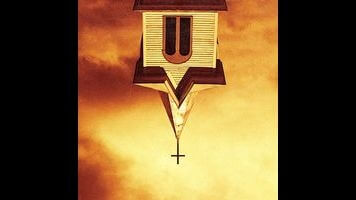An adaptation of Garth Ennis’ comic book series Preacher has been in some form of development for about 20 years, which is almost as long as it’s been since the first issue was published. The appeal of the premise is obvious, even to those who haven’t read the comics: Foul-mouthed ruffians clash with tight-lipped guardians in a battle of good, evil, and all the depraved beings in between. Frame it as a Western, and prepare to ride off into the syndication sunset. And yet each proposed project—a movie, an HBO series, another movie—has merely languished in purgatory, awaiting some brave soul to undertake it once again.
The adaptation’s unlikely saviors eventually came in the form of Seth Rogen and Evan Goldberg, purveyors of such fine stoner comedies as Pineapple Express and This Is The End. Their involvement raised questions about how well the duo would interpret Ennis’ irreverent—and that is putting it mildly—work for the small screen, and whether they were even cut out for the job. But those fears can be laid to rest: Rogen and Goldberg, who have teamed up with Breaking Bad producer Sam Catlin, have captured the spirit of Ennis’ comics. While they deviate plenty from the deviant source material, those decisions serve the story and suit the new format.
The producing trio effectively wrangles many of Ennis’ ideas, including the arrival of a cosmic entity that changes the course of one man’s life. That’s Jesse Custer (Dominic Cooper), who’s been reimagined as the prodigal son of a preacher, man. The character’s return to his hometown was featured in the comics, with significantly more punitive results. But here, Jesse is more disillusioned officiant than shellshocked survivor of familial strife, though he could just be holding his post-traumatic disorder at bay. And he’s already waging war against sin as the titular preacher in the tiny Texas town of Annville well before his encounter with Genesis.
Our introduction to Jesse in the pilot is followed in short order by the first appearances of Cassidy (Joseph Gilgun), a scamp of an Irish vampire, and Tulip (Ruth Negga), a charming career criminal. Eventually everyone’s in Annville, with some worse for wear than others. Jesse and Cassidy hit it off, but the preacher maintains his distance from his old flame Tulip, who attempts to seduce him with a big score. In due time, they’ll all embark on a mission to find God to mete out justice that’s not so divine. For now, the series is content to lay the groundwork for their friendship, with just a hint of the love-triangle angle.
Fans of the comics might feel cheated by this convenient arrangement of players, but the setting doesn’t feel contrived. The convergence does sacrifice some of the world building and traversing, but it also gives Jesse someone to help him understand his newfound power, which is the Voice Of Command (or God, depending on who you ask). And it’s just what it sounds like—the ability to command almost anyone to do practically anything. Despite his supernatural guide, Jesse still stumbles in discovery; his counsel becomes dangerous when taken too literally.
The moments in which Jesse’s advice goes awry aren’t played for laughs; instead, they underscore the notion that even having a direct line to God doesn’t ensure that his message won’t be distorted. As befitting its AMC home, Preacher leans heavier on the supernatural and dramatic elements of its story. This could be the result of Catlin’s influence breaking through and reining in some of Rogen and Goldberg’s goofier instincts, but the show doesn’t suffer for it. There’s still plenty of dark humor throughout, including a church sequence that appears to be an homage to Evil Dead.
Preacher also diverges from the source material with its thoughtful presentation of all of its characters. The comics didn’t lack for caricatures (and gross-out moments), but the series provides nuance to even the hateful, racist Sheriff Hugo Root, as well as the ostensible villain of this piece, Odin Quincannon. Also significant is its characterization of Tulip, who’s worked through most of her feelings of abandonment and demands to be treated as an equal much earlier in her story here. Jesse’s arrogance is tempered by a desire to do good, and there’s no better place for charity to begin than at home. But his misguided efforts ultimately set the stage for the first of many showdowns, a fact that, if he acknowledged it, might actually make him sympathize with his maker.
All of these choices, when combined with the sumptuous visuals, make for a successful adaptation, though they will probably be criticized by longtime fans for making the material more palatable or too accessible. And Preacher’s structure is reminiscent of other superhero origin stories, if those tales included sweet-natured individuals who are nonetheless nicknamed Arseface. But it’s also faithful to Ennis’ comics, sacrilege and all. Cassidy is suitably rakish, Tulip is a badass, and Jesse is still conflicted about serving God. Most importantly, Jesse is still trying to follow his father’s advice to be one of the few good guys in the world—it’s just that he’s now following his father’s example by leading a congregation.































![Rob Reiner's son booked for murder amid homicide investigation [Updated]](https://img.pastemagazine.com/wp-content/avuploads/2025/12/15131025/MixCollage-15-Dec-2025-01-10-PM-9121.jpg)









